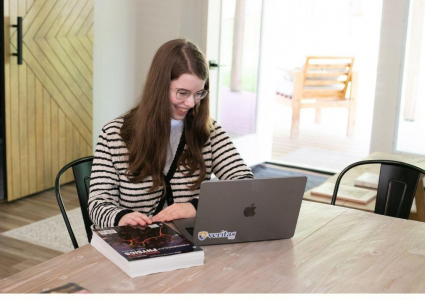Politics, Media, and Engaging our Culture

Here’s a pro-tip for eliminating awkward silence in a room full of people: state your political opinion with conviction. I cannot promise you that the awkwardness will cease, but I can assure you that the silence will.
Wouldn’t it be easier to simply keep our heads down and not form opinions?
Well, yes. Disconnection and disinterest would be much easier. But would it be right? Absolutely not.
Observers of history know that political tension and fierce debate are not unique to modern American politics. The media’s influence on national opinion or political decisions is not either. But there is one major factor that is truly unique: the internet and, with it, the overwhelming access to information.
Those who engage in online learning know that the internet and access to unlimited sources of information can be an incredible blessing. The community that students can create with people from other backgrounds and experiences has helped to create this rich culture that is truly unique to VSA.
The internet can be truly great.
It can also be the cause of disinterest and disconnection, especially when it comes to politics.
The rapid outpour of information from various media outlets can create a sense of data fatigue and produce a generation that finds mindless acceptance of one person’s reported assessment of a situation preferable to actively evaluating the primary sources. Conversely, it often creates a mass acceptance of the postmodern fallacy that there is no absolute truth, that notion that you may believe something entirely different from me, but we are both right.
Both results are severely problematic.
Firstly, God has created us with minds that can think critically. We must make every effort to be informed. Many of us live in countries where our voices and opinions have direct links to what happens in our Government. Yet, too often, we squander our power by being content with ignorance. Or we feel so overwhelmed by contrasting stories and opinions that we shut down.
Secondly, there is absolute truth. We may differ in our understanding of that truth and how it applies to our lives, but it does exist. The American theologian Francis Schaffer remarked that “in passing, we should note this curious mark of our own age: the only absolute allowed is the absolute insistence that there is no absolute.” This culture’s twisted postmodern ideology has led many believers into hiding when they cannot reconcile their desire to align themselves with what is right when most political options feel so wrong.
So what do we do? How do we avoid the pendulum swing extremes of ignorant acceptance of our standard of what is right or willful isolation from any such conversation?
Below are some steps that Christians can take to begin to engage our culture and navigate the unending sources of conflicting information:
1. Remember who our ultimate service is for.
“It should not be possible for Christians to be disillusioned. We should have no illusions in the first place. Our faith is in Jesus Christ alone” (Gene Edward Veith Jr., Loving God with All Your Mind: Thinking as a Christian in a Postmodern World). It is important to engage in politics and to have opinions about the world around us, but we need to avoid the hopelessness that is inevitable when our hope is found in something other than God. No politician can redeem our nation. No news source can change everyone’s heart. God alone has the power to create a revival and to move hearts toward Him.
2. Seek truth constantly.
There will always be many sides to a story, but the reality of what happened is not fluid. Seek out primary sources. Work hard to identify if the story you are reading is true through your own God-given critical thinking and research abilities. If those skills are a bit rusty, work on finding ways to ignite your desire to ask questions in order to seek truth. Here is a wonderful article by Ty Fischer that reminds us how engaging in literature can strengthen these skills.
3. Remember that ‘bias’ is not synonymous with ‘bad.’ Credibility matters.
Requesting that someone report something without bias is like asking for ice without water. Political, cultural, and social biases are impossible to avoid. We all have them. But this should push us to look for reporters who make an effort to identify their bias and bring in other perspectives. This year we had an editor from The Wall Street Journal come to class and share some of the essential aspects of looking for ‘balanced’ reporting and truth seeking. He emphasized that it is essential to read constantly. Find ways to continually expose yourself to more ideas and learn what styles of reporting you enjoy. Then identify authors who have the markers of credibility.
Ask yourself the following when reading or listening to a report: Did they attempt to show multiple sides of an issue? Did they reference sources that fall on all sides of the ad fontes chart (which of course also holds its own bias)? Was it an opinion piece disguised as fact based news? Did they have credible and mostly identifiable resources and references? What else do they report on? Thinking critically about where you get your information will help to narrow what information you absorb.
4. Avoid social media as your primary source of information
“I read an article about…” But did you? Or did you read the little blip at the top with a funny picture. Worse yet, was it just a meme that made you laugh so you inferred the background meaning as truth. Ok, by ‘did you’ I really mean ‘did I.’ The headline news culture is real and so very tempting to resort to. Headlines are intentionally provocative. Read the article and refer back to point number 3 for credibility checks.
5. Seek other perspectives.
I do not just mean republican versus democrat. I mean other relevant perspectives. I can have a lot of opinions about what it means to grow up in Canada, but I have never been there a day in my life. If the issue is about someone of another race, gender, socio-economic background, or religion then perhaps it is time to have an awkward conversation with someone who can shed light on their own experiences. You may find it is not as awkward as you thought. In fact, engaging with the diversity that God has given us one of the most beautiful and enriching experiences that you can partake in. As soon as you feel an opinion forming that involves something you have not experienced, reach out to someone who has. Do more research. Then, you will have the data needed to begin forming an opinion that you can defend with clarity and grace.
6. Know your knowledge gaps.
This year my Government class spent a week discussing the government’s role in business and the market. I am neither a business owner nor am I an employee of the FTC. Because of the wonders of the internet, we had the CEO of an international public corporation come in and discuss his experience with federal involvement in his business; I am positive that my students gained more from this than I could have ever shared. Why? Because there is a gap in my knowledge and experience.
Each time we come across something we do not know much about, we need to stop and ask ourselves one question: Is it reasonable to assume that I could know more about it if I had access to the right sources? If so, then every effort should be made to learn and grow as we analyze the primary sources. If not, then we put on our critical thinking caps and look for a variety of people who are respected in the field, and perhaps we will not share our own thoughts until we have gathered more information. Not knowing something is not a bad thing. Refusing to learn something is.
This is not the time to disengage. This is not the time to fan the flame of anger and dissension. This is the time for the Christian community to rise up and change how we understand the world around us.
Students who study at Veritas are uniquely equipped to change the world. They learn to think critically and form well-founded opinions. There is not a day I teach that I am not challenged by a thought or a question that one of these brilliant students shares. Along with acquiring knowledge, they learn to share these thoughts with love and compassion.
Let us raise up our children and teach them to be like the Bereans: constantly looking to God’s word to determine if what Paul said was true (Acts 17:11). Let us model this through our handling of the political environment around us.
The next time you are at a dinner party and someone brings up politics- don’t get awkward. Come prepared to engage and show them the fruits of your love for Christ through reasonable, truth-seeking conversation.






